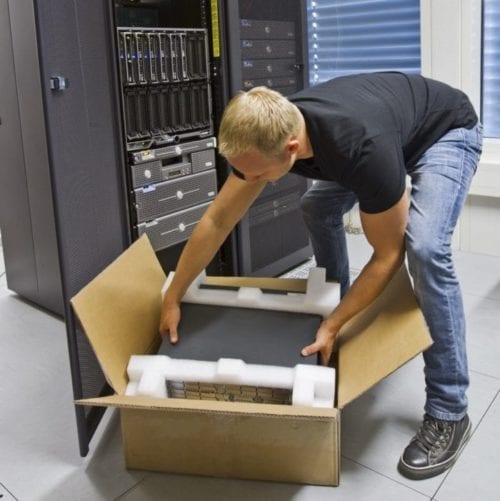If you’re ready to sell your used servers, the quickest option is to request a quote through our server buyback program. Just fill out a short form with your server details, and if your equipment meets our $2,500 minimum, we’ll send you a purchase offer right away.
But what if you’re still deciding where to sell? You’re in the right place. In this guide, we’ll walk through the best places to sell used servers and IT equipment, breaking down the pros and cons of each option so you can choose what works best.
Before we dive into marketplaces and vendors, let’s cover a few key principles for selling servers, from protecting sensitive data to documenting your hardware properly.
IT Asset Disposition (ITAD) Services
For bulk sellers, IT asset disposition (ITAD) vendors are usually the best option. They specialize in maximizing value from decommissioned IT equipment and can provide a hassle-free process.
Benefits of ITAD vendors include:
- Bulk buyback offers, often paid within days to a month
- On-site logistics support such as teardown, palletization, and shipping
- Certified data erasure or destruction to keep you compliant
- Help with discovery and refresh strategies for larger environments
If your goal is to minimize effort while maximizing secure returns, an ITAD partner is the most efficient route.
Why ITAD Services Are the Best Way to Sell Used Servers
For most sellers with bulk quantities of used servers, ITAD services remain the most efficient and secure option. They handle the logistics, ensure data security, and provide competitive offers, saving you time while helping you maximize returns.
Want to learn more about where the industry is headed? Check out our post on Defining Edge Computing and Edge Data Centers for insights on the future of data centers.
If you’re ready to see what your servers are worth, get started today. As a family-owned ITAD vendor, we offer free quotes, certified data destruction, and a straightforward resale process. Simply fill out the form below or visit our server resale page to request your personalized offer.
eBay and Online Marketplaces
eBay remains the most recognized online marketplace for second-hand technology, but it’s designed for consumers rather than enterprises. Selling used servers here comes with some challenges:
- Seller fees eat into profits.
- You need established seller ratings to compete with trusted accounts.
- Finding buyers for wholesale quantities of servers is difficult.
- Bulk pricing is often unrealistic, as buyers expect discounts.
Other online marketplaces, such as Amazon Marketplace or specialized IT resellers, may give you access to a broader audience, but they share many of the same drawbacks: high competition, listing fees, and limited enterprise buyers. These platforms are best suited for individual sellers with just a few servers and the time to manage listings.
Craigslist and Local Classifieds
Craigslist is a well-known local classifieds site, but it comes with risks for high-value items like servers. It offers no fraud protection, no dispute resolution, and no buyer guarantees.
If you choose Craigslist, always meet in a public, safe location. Scams are common, so vet inquiries carefully. The benefit: there are no fees, making it appealing for sellers willing to trade safety and convenience for zero overhead.
Beyond Craigslist, Facebook Marketplace, OfferUp, and Letgo provide similar opportunities for local, fee-free sales. These platforms expand your reach but carry the same issues, time-consuming negotiations, scams, and difficulty selling large quantities. They’re most viable for smaller-scale, local transactions.
Reddit and Online Forums
Communities on Reddit are particularly active for IT and enterprise hardware. Subreddits such as r/hardwareswap, r/sysadmin, and r/homelab connect you with system administrators, engineers, and hobbyists. These users are knowledgeable, and many actively look for affordable used hardware.
The advantages:
- Niche audiences who understand the value of enterprise gear
- Opportunities for fairer pricing compared to consumer platforms
- Communities that can help you estimate value even if you don’t sell
That said, you’ll need to vet buyer profiles carefully, follow community trading rules, and sometimes use third-party escrow services to stay safe.
Other online forums and Discord groups for IT professionals can provide similar opportunities. These platforms are best for individual parts or small lots, and for sellers comfortable navigating community-driven trading environments.
Preparing to Sell Your Used Servers
If you are planning to shred or discard your drives separately from the server resale process, you can disregard this section.
For everyone else, data security should be your top priority when selling used servers. Sensitive information left on a drive can create serious risks, so proper sanitization is essential. (For a deeper dive, see our blog post: Are Old Systems Spilling Secrets?)
If your organization doesn’t have to follow specific data erasure standards like NIST 800-88, a single-pass overwrite is typically sufficient. Many industry authorities consider one secure overwrite enough to protect against data recovery attempts.
It’s nearly impossible to sell used servers online if you don’t have complete details about your equipment. Unfortunately, many data centers and enterprises keep outdated or incomplete inventory records, which makes the process even harder.
Before listing your servers, it’s smart to conduct a comprehensive inventory check. Document key specs and components so potential buyers know exactly what you’re offering. For most resale purposes, you’ll need:
- Model numbers and part numbers
- Total quantities available
- Details on critical components such as hard drives, SSDs, processors, GPUs, and RAM
Including clear photographs of your servers is also important, visuals make your listings more credible and appealing.
If a particular server model has little resale demand, you may consider parting it out, selling valuable components like RAM or CPUs individually. However, this should only be done if you’re familiar with the IT resale market or have exhausted other options, since breaking down equipment can be time-intensive and risky.



